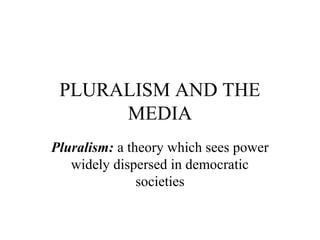
SociologyExchange.co.uk Shared Resource
- 1. PLURALISM AND THE MEDIA Pluralism: a theory which sees power widely dispersed in democratic societies
- 2. Does the media provide the information required for an informed citizen? Does it matter who owns and controls the media? What is the relationship between the ownership and control of the media? To what extent do the owners of media corporations control the content of the media they produce?
- 3. Pluralism Theory • Representative democracies are societies in which the concerns and interests of the population (and sub groups within the population) are represented • The Electorate elect politicians to represent the nation. • Pressure groups represent sections of the population (NUT, BMA,) to pressure the government to further the interests of their members • No one group is dominant, all groups have a say in the running of society, all adults have a freedom to choose who governs
- 4. • Print out cards allocate one to each student • Students teach each other • Check learning with a talk-for-30-seconds- concept card
- 5. REFLECTING PUBLIC DEMAND • The content of the mass media mirrors what the public wants. They cater to the public as a whole by responding to the demands of the market. • Those who own and control take a pluralist view in that they must satisfy public demand to stay in business.
- 6. DIVERSE SOCIETY DIVERSE MEDIA • No one group dominates, therefore the mass media mirrors the diversity of societal opinions • They represent a range of views which allows audience freedom to choose between them • Choice is catered for through newspapers, magazines, films, radio, TV etc • Bias occurs because they broadcast what people sympathise with and want to hear. E.g. If Asylum seekers are represented as a problem it is because this reflects the majority view.
- 7. DIGITAL TECHNOLOGY • All forms of communication can be coded, stored and relayed in digital form (Films, music, library, Kindle) • Transfer of power is from owners to audience who choose what they want to watch, listen, read and when.
- 8. MEDIA CONCENTRATION • Concentration of ownership is essential for survival in an increasingly global market. • Only global companies such as Time Warner, Viacom and News International have the resources to provide audiences with a wider choice and a greater range of media products at affordable prices. • Increasing media concentration should be welcomed
- 9. MEDIA DEREGULATION • BBC is state owned and contents regulated by public service broadcasting which states that the BBC should ‘inform, educate and entertain. • The introduction of commercial TV in 1954 brought a reduction in regulations, resulting in rapid expansion of channels and competition between terrestrial, satellite and cable companies. • Most countries limit the concentration of media ownership to prevent domination but in recent years the laws have relaxed
- 10. PRIVATE OWNERSHIP • Pluralist welcome media deregulation because private ownership is the most effective way to provide a wide range of choice and to compete with each other to give audiences what they want. – If they don’t they go out of business • Publicly owned media and state regulation is dangerous as they concentrate too much power and offer limited choice.
- 11. EVALUATION
- 12. MEDIA CONCENTRATION AND DEMOCRACY • 1983 most mass media in USA was owned and controlled by 50 corporations which had serious consequences. – Views are far right (conservative) because they reflect the views of the owners. No room for liberal or radical voices – Less local news – programmes are pre-recorded and the same programmes are broadcast throughout USA – Choice has narrowed because they are broadcasting the same thing, little diversity of opinion therefore democracy is under threat
- 13. THE DRIVE FOR PROFITS • BBC funded by licence fee (£140 pa) all others are funded by advertising • therefore should be accurate and impartial and produce a variety of programmes to cater for all groups • Ofcom regulates output of both but rules are now relaxed which means privately owned broadcasters are in business to make money for profit.
- 14. MONEY FOR PROFIT • Infotainment – Increasing readership of newspapers, human interest stories has replaced political coverage – News is now part of the entertainment industry. Gossip about reality TV stars is common features. Investigative journalists are replaced by celebrity columnists and presenters • Advertising revenue – Focus on purchasing power of mass audience, the larger the audience the higher the advertising fees. Has lead to a decline in the number of newspapers and minority interest programmes. – Boundaries are being broken down, companies pay for products to be ‘placed’ in films.
- 15. DIGITAL TECHNOLOGY • Audiences have to pay to access the vast libraries of digital products, however, some cannot afford to pay • Power lies with those who own and control cultural products, therefore media corporations can decide what is made available and at what price.
- 16. INFLUENCE OF PROPRIETORS • Proprietors influence on media content is limited by their need to make profits. – INSTRUMENTAL APPROACH • Proprietors directly influence the content of media they own. There is a growing concentration of media who mount propaganda campaigns to defend the economic, social and political agenda of privileged groups.(Rupert Murdoch exercises editorial control of Sun and News of the World) – THE STRUCTURAL APPROACH • Top media executives exercise power because it is impossible for one individual to control day to day output (Murdoch). His power is allocative in that he sets the goals, makes financial decision and sets the tone. But despite limitation it is still possible to express their own views in the media they own.
- 17. Reflecting public demand Diverse society Digital technology Media concentration Media deregulation Private ownership Media concentration and democracy The drive for profits Influence of proprietors infotainment Pluralism theory Diverse media